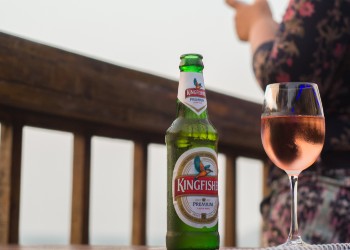You might think there are two types of people in this world: those who love beer and those who prefer wine. While opinions may vary, and die-hard fans of either may wish to stand on a soapbox to count the ways they love thee, the two beverages are actually way more similar than you might first think. Each has a long and rich history, a range of styles and countless flavour profiles to suit anyone’s palate – no matter how fussy. And of course, there’s no denying both drinks are delicious. If you’re a seasoned beer drinker, it may be a little daunting to know which wine varietal you will most enjoy – but fear not! We’ve rounded up the best wine choice based on your favourite beer preference so that you can start moving over into the tannin-side of life.
Crisp, Clean, & Light
Lager & Pilsner
Wine to try: Sparkling wine
Lager and Pilsner are some of the best thirst-quenching beers to enjoy – just like sparkling wine. When served ice cold, both beverages are perfectly refreshing – ideally sipped on a balmy summer day. Typically, the majority of sparkling wines are dry and bright, making them a great pick for lovers of lager. Our go-to is the Capes Méthode Cap Classique. Made in the traditional méthode champenoise method (which requires a secondary fermentation in the bottle), it’s incredible value-for-money makes it affordable to drink regularly and pairs well with a wide range of foods including chicken, fish and pasta dishes.
Wheat Beer
Wine to try: Chardonnay
The fruity notes of wheat beer have met their match in the refreshing, tropical flavours common to a warm-climate Chardonnay. Even the more buttery, vanilla flavours found in cool-climate Chardonnay will delight those who favour wheat beer. This type of wine is usually aged in oak, and now so are many wheat beers. With their golden colour and similar oaky undertones, they will help you make a seamless transition from beer to wine sipping.
Malty, Medium-Bodied, & Hoppy
Amber Ale/ Red Ale
Wine to try: Sherry
Red ale can be difficult to compare. As it is highly malted, the flavours are quite unique and not easily emulated. The closest match here is sherry. They are both alike in their nutty, complex and fine oxidised flavours. While a small portion of sherry is served as a dessert wine, the majority of this fortified wine varietal is dry. It is a great transition wine for lovers of malty beverages.
Pale Ale
Wine to try: Merlot
Lovers of pale ale will appreciate the easy mellowness of Merlot. It is equally as light and balanced as pale ale, with mild flavours of orchard fruit. Often recommended to people who are new to the world of wine, Merlot is a foolproof choice – sometimes called the jazz-singer of wine, for it’s easy to sip on smoothness.
Dark, Stout Beer
Imperial Stout
Wine to try: Cabernet Sauvignon
The complexity and richness of this dark red wine can be reminiscent of stout beer. These two beverages share notes of toasted oak, dark chocolate and liquorice. Cabernet Sauvignon is satisfying without being heavy, making it a popular choice amongst red wine lovers. Stout drinkers will appreciate its finesse and bold flavour. Try a classic bottle of Bordeaux. Its full-bodied flavours pair delectably with similarly rich meals such as stews, steaks and ribs.
Belgian Dubbel
Wine to try: Port
If you’re a fan of easy-drinking beer varieties that still have sharpness and character, you will appreciate the full-bodied mouthfeel of Port wine. Try Ruby Port – it’s affordable, flavourful and meant to be enjoyed young.
Unusual Varieties
Oyster Stout
Wine to try: Muscadet
As its name would suggest (Oyster Stout), this beer is an outstanding pairing with seafood, particularly shellfish. Another wine that goes great with seafood is a light, zesty Muscadet. While a dark Oyster stout is briny and may sound like a long way off from the flavours of white wine, Muscadet is in fact surprisingly saline itself due to its high acidity.
Lambic Beer
Wine to try: Pinot Noir
This beer is one of the most unique ones around. Native to Belgium, Lambic beer is fermented through wild yeasts and bacteria found in the Zenne valley. This gives the beer its distinctive dry flavour and slightly sour aftertaste. The popular Pinot Noir has the closest likeness. Both beverages share a fruitiness and acidity that set them apart from their respective counterparts, making them perfect for anyone looking to step outside of their comfort zone.
Whether you’re a beer head or a wine lover, Explore Sideways would love to put together a special curated tour for you to enjoy. Simply get in touch with us and we’ll make sure to cater to your tastes – be it beer or wine inclined!
